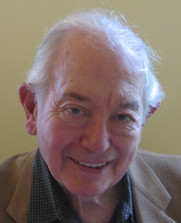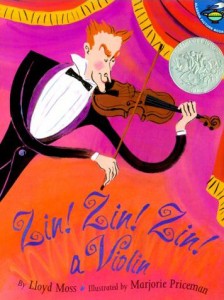2018 School Spending Survey Report
Lloyd Moss, Children’s Book Author and Radio Host, Dies at 86
Classical music radio host Lloyd Moss, who transferred his love of music to several acclaimed children’s books, including the Caldecott Honoree Zin! Zin! Zin! A Violin! (S&S, 1995), died on August 3 in Westchester County, NY. He was 86.
 Classical music radio host Lloyd Moss, who transferred his love of music to several acclaimed children’s books including the Caldecott Honoree Zin! Zin! Zin! A Violin! (S&S, 1995), died on August 3 in Westchester County, NY. He was 86. Though Moss served as the afternoon host on WQXR radio in New York City, the classical music station of The New York Times for 53 years before retiring in 2006, he once said, “I believe that my immortality lies in my books.” Moss published his first children’s book, Zin! Zin! Zin!, at the age of 69. It uses the instruments in an orchestra to illustrate the concept of counting and the parallel concepts of solos, duets, trios, etc. Illustrated by Marjorie Priceman, the book received a star review from School Library Journal and was awarded the 1996 Caldecott Honor. In her SLJ review, Jane Marino called the book, “A delight for music classes as well as a great introduction to the concert hall” and noted, “This title will surely be met with applause.” The book came about when a family member who worked for Simon & Schuster viewed a scrapbook kept by Moss’s wife, Anne, of all the poems he wrote to her and his children on various special occasions. “The book came together magically,” Moss once said. “I look at it as the moment when I integrated my love of books and music into a tangible form that could be shared with the world.”
Classical music radio host Lloyd Moss, who transferred his love of music to several acclaimed children’s books including the Caldecott Honoree Zin! Zin! Zin! A Violin! (S&S, 1995), died on August 3 in Westchester County, NY. He was 86. Though Moss served as the afternoon host on WQXR radio in New York City, the classical music station of The New York Times for 53 years before retiring in 2006, he once said, “I believe that my immortality lies in my books.” Moss published his first children’s book, Zin! Zin! Zin!, at the age of 69. It uses the instruments in an orchestra to illustrate the concept of counting and the parallel concepts of solos, duets, trios, etc. Illustrated by Marjorie Priceman, the book received a star review from School Library Journal and was awarded the 1996 Caldecott Honor. In her SLJ review, Jane Marino called the book, “A delight for music classes as well as a great introduction to the concert hall” and noted, “This title will surely be met with applause.” The book came about when a family member who worked for Simon & Schuster viewed a scrapbook kept by Moss’s wife, Anne, of all the poems he wrote to her and his children on various special occasions. “The book came together magically,” Moss once said. “I look at it as the moment when I integrated my love of books and music into a tangible form that could be shared with the world.”  The author also said that his love of doggerel inspired him to write such lines as "Fine FRENCH HORN, its valves all oiled/Bright and brassy, loops all coiled," and "FLUTE that sends our soul a-shiver;/FLUTE, that slender, silver sliver." The composer and arranger Marvin Hamlisch wrote a score for orchestra to accompany the book and, in 1998, Moss read his work accompanied by Hamlisch and the Pittsburgh Symphony. Moss went on to write two other music-themed books. Our Marching Band (Putnam, 2001) is a story of young instrument-toting hopefuls who transform themselves into an energetic, smartly uniformed band, while Music Is (Putnam, 2003) uses rhymes to talk about the importance of music. In its review of the latter, SLJ notes that the text shows how music “appears in all aspects of our lives, from the mundane ‘music in the elevator,/sometimes music on the phone’ to the exciting ‘Brass or strings, when played with brio,/lift my spirits to the sky.’” Moss was born in Brooklyn on November 17, 1926, and grew up surrounded by music and books. His father owned a beauty parlor where the radio was always tuned to WQXR (the same station where Moss would later make his career in broadcasting). As a child he frequented a second hand bookshop, where he found Tarzan of the Apes by Edgar Rice Burroughs, as well as adventure stories by Jack London, James Oliver Curwood, and Zane Grey. At seventeen he joined the Army and, after World War II, he entered the field of radio. He is survived by his wife Anne, four children, and two grandchildren. In an interview with the Parent’s League of New York, Moss once said that the final lines from Music Is provide a fitting coda to his sentiments about music and its influence on his life: If there never had been music, If it never did exist, What would life be without music? Think of what we would have missed!
The author also said that his love of doggerel inspired him to write such lines as "Fine FRENCH HORN, its valves all oiled/Bright and brassy, loops all coiled," and "FLUTE that sends our soul a-shiver;/FLUTE, that slender, silver sliver." The composer and arranger Marvin Hamlisch wrote a score for orchestra to accompany the book and, in 1998, Moss read his work accompanied by Hamlisch and the Pittsburgh Symphony. Moss went on to write two other music-themed books. Our Marching Band (Putnam, 2001) is a story of young instrument-toting hopefuls who transform themselves into an energetic, smartly uniformed band, while Music Is (Putnam, 2003) uses rhymes to talk about the importance of music. In its review of the latter, SLJ notes that the text shows how music “appears in all aspects of our lives, from the mundane ‘music in the elevator,/sometimes music on the phone’ to the exciting ‘Brass or strings, when played with brio,/lift my spirits to the sky.’” Moss was born in Brooklyn on November 17, 1926, and grew up surrounded by music and books. His father owned a beauty parlor where the radio was always tuned to WQXR (the same station where Moss would later make his career in broadcasting). As a child he frequented a second hand bookshop, where he found Tarzan of the Apes by Edgar Rice Burroughs, as well as adventure stories by Jack London, James Oliver Curwood, and Zane Grey. At seventeen he joined the Army and, after World War II, he entered the field of radio. He is survived by his wife Anne, four children, and two grandchildren. In an interview with the Parent’s League of New York, Moss once said that the final lines from Music Is provide a fitting coda to his sentiments about music and its influence on his life: If there never had been music, If it never did exist, What would life be without music? Think of what we would have missed! RELATED
RECOMMENDED
CAREERS
The job outlook in 2030: Librarians will be in demand
CAREERS
The job outlook in 2030: Librarians will be in demand
ALREADY A SUBSCRIBER? LOG IN
We are currently offering this content for free. Sign up now to activate your personal profile, where you can save articles for future viewing






Add Comment :-
Be the first reader to comment.
Comment Policy:
Comment should not be empty !!!